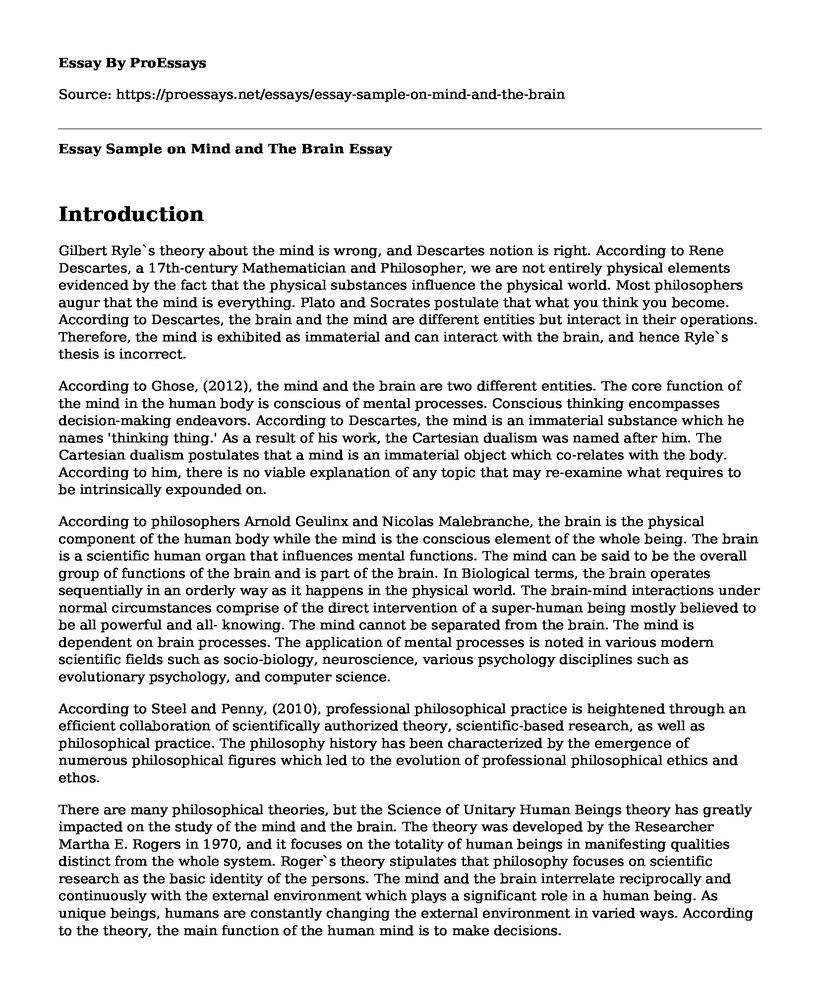Introduction
Gilbert Ryle`s theory about the mind is wrong, and Descartes notion is right. According to Rene Descartes, a 17th-century Mathematician and Philosopher, we are not entirely physical elements evidenced by the fact that the physical substances influence the physical world. Most philosophers augur that the mind is everything. Plato and Socrates postulate that what you think you become. According to Descartes, the brain and the mind are different entities but interact in their operations. Therefore, the mind is exhibited as immaterial and can interact with the brain, and hence Ryle`s thesis is incorrect.
According to Ghose, (2012), the mind and the brain are two different entities. The core function of the mind in the human body is conscious of mental processes. Conscious thinking encompasses decision-making endeavors. According to Descartes, the mind is an immaterial substance which he names 'thinking thing.' As a result of his work, the Cartesian dualism was named after him. The Cartesian dualism postulates that a mind is an immaterial object which co-relates with the body. According to him, there is no viable explanation of any topic that may re-examine what requires to be intrinsically expounded on.
According to philosophers Arnold Geulinx and Nicolas Malebranche, the brain is the physical component of the human body while the mind is the conscious element of the whole being. The brain is a scientific human organ that influences mental functions. The mind can be said to be the overall group of functions of the brain and is part of the brain. In Biological terms, the brain operates sequentially in an orderly way as it happens in the physical world. The brain-mind interactions under normal circumstances comprise of the direct intervention of a super-human being mostly believed to be all powerful and all- knowing. The mind cannot be separated from the brain. The mind is dependent on brain processes. The application of mental processes is noted in various modern scientific fields such as socio-biology, neuroscience, various psychology disciplines such as evolutionary psychology, and computer science.
According to Steel and Penny, (2010), professional philosophical practice is heightened through an efficient collaboration of scientifically authorized theory, scientific-based research, as well as philosophical practice. The philosophy history has been characterized by the emergence of numerous philosophical figures which led to the evolution of professional philosophical ethics and ethos.
There are many philosophical theories, but the Science of Unitary Human Beings theory has greatly impacted on the study of the mind and the brain. The theory was developed by the Researcher Martha E. Rogers in 1970, and it focuses on the totality of human beings in manifesting qualities distinct from the whole system. Roger`s theory stipulates that philosophy focuses on scientific research as the basic identity of the persons. The mind and the brain interrelate reciprocally and continuously with the external environment which plays a significant role in a human being. As unique beings, humans are constantly changing the external environment in varied ways. According to the theory, the main function of the human mind is to make decisions.
The Science of Unitary Human Beings theory is relevant to the study of the mind and the brain in various ways. The theory emphases on the persons` wholeness. According to Rogers, humans cannot be compacted to various parts but must be considered wholly. The brain and the environment are integral components. The Rogers theory describes, explains, and further prescribes measures pertaining to brain and mind supported by elaborate scientific research. Rogers viewed mental processes as a lifelong process and that they are part and parcel of humanity. Rogers formulates that philosophers should mainly focus on two pillars namely; the brain and the mind. According to the Science of Unitary Human Beings theory, the interconnection between the surroundings develops a person` honor and originality thereby promoting wholesome being.
According to Steel and Penny, (2010), our mind determines who we are. The overall conscious experiences are different from innate substances. Descartes postulates that our perceptions and experiences on the external stimuli and environment determine our actions and responses towards the phenomena. Personal experiences depend on the information that comes into the various sensory organs such as the ears, eyes, skin, tongue, and nose. Philosophers Karl Popper and Carew Eccles propose that the mental aspects influence various states such as human desires and religious beliefs. The conscious details directly relate to the physical world. According to them, the human mind cannot be measured in aspects of length, width, weight, and height. In this regard, the brain can be quantified in terms of varied dimensions such as weight, height, and length.
Conclusion
According to philosophers, the mind and brain form philosophical paradigm and more research are needed in the field. Some breakthroughs are in progress in some key areas such as consciousness and the issue of mental states. All in all, the mind is not distinct from the body system.
References
Steel M. S, and Penny D. (2010) Origins of life: Common ancestry put to the test. Nature 465 (7295). 168-9
Ghose P. (2012). The earliest evidence of life on earth `found`. BBC News science and environment,
Cite this page
Essay Sample on Mind and The Brain. (2022, Dec 06). Retrieved from https://proessays.net/essays/essay-sample-on-mind-and-the-brain
If you are the original author of this essay and no longer wish to have it published on the ProEssays website, please click below to request its removal:
- Religion, Morals, and Slavery Essay
- Defending Walls' Arguments on Ethics and Morality
- Ethical Decision Making and Cases Paper Example
- Shell's Code of Ethics: Ensuring Ethical Practices - Research Paper
- Race & Identity: How Morality Influences Our Decisions - Essay Example
- Essay on John Stuart Mill's Utilitarian Ethics: Consequences of Conflict & Pursuit of Happiness
- Bridging Gaps, Fostering Maturity, and Building Meaningful Relationships in Organizations - Paper Sample







